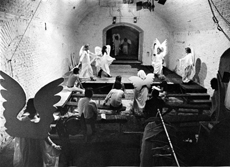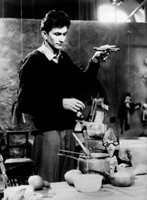|
|
| Michael Meschke - short films and documentaries - short film Colgate, advertising film, 1950-is Nunnornas krig (White-shining Place or The Nuns War), short film, 1969 Prague '69, short film, 1969 Ellika Lindén, a portrait, short film, 1969 Dantons död, Riksdagshuset, (Danton's Death, Parlamentbuilding), documentary, 1971 Ulla Sjöblom, portrait, short film, 1977 Nang Yai - a threatened Thai tradition, documentary, 2005 |
- feature film Purgatory after "The Divine Comedy" by Dante. Direction in cooperation with Silvano Agosti, 1971 Purgatory after "The Divine Comedy" by Dante. Direction in cooperation with Silvano Agosti, 1971Photo: Göran Cronwall |
|
- puppet theatre production recorded for TV The Tales of Hoffmann by E.T.A. Hoffmann, premiere in 1959, TV-recording in 1975 by SVT, (Swedish Television) The Flying Drum by Lennart Hellsing, premiere in 1962, TV-recording in 1965 by SVT, (Swedish Television) The Good Woman of Setchuan by Bertolt Brecht, premiere in 1963, TV-recording in 1964 by SVT,(Swedish Television) Ubu Roi by Alfred Jarry, premiere in 1964, TV-recording in 1972 by SVT, (Swedish Television) |
|
- TV-series Benjamin's workshop, 5 parts, each 30 min, by SVT, (Swedish Television) in 1961 Billy Boy, 5 parts, each 15 min, by SVT, (Swedish Television) in 1961  Here comes Benjamin, 45 min, by SVT (Swedish Television), 1962 Here comes Benjamin, 45 min, by SVT (Swedish Television), 1962The Summa Summarum Family, 6 parts, each 10 min, by SVT (Swedish Television), 1962 Chat with Benjamin, 6 parts, each 20 min, by SVT (Swedish Television) in 1963 Photo: SVT The Man Who Made Angels Fly Is a film by Polish film maker Wiktoria Szymanska about Michael Meschke, based upon generous access to the artist´s materials and legacy. The producers, Luna W and Les Films du Balibari, are circulating different versions some of which show scenes filmed secretly, not included in the authorizations signed by Michael Meschke. They are his puppet Shen Te walking in a church and the separated head of his puppet Don Quichotte in a Paris street, métro, Pigalle, the director´s bathtub, bed etc. In spite of the qualities of the film, Michael Meschke repudiates the unethical procedure and regrets the producers refusal to withdraw these unauthorized scenes, also to provide complete credits about participants and about the authors of the literary quotations in this film, namely Sophocles, August Strindberg, Bertold Brecht and Michael Meschke. |